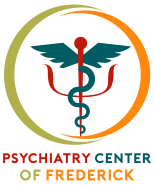Depressive Disorders
At Psychiatry Center of Frederick, we understand the profound impact that depression has on an individual’s life. It’s more than just feeling sad or low; it’s a serious mental health condition that can affect every aspect of a person’s existence, from their physical health to their relationships and career. We are committed to providing comprehensive, personalized treatment for depression, helping our patients navigate their way back to a healthier, more balanced state of mind.
Our approach to treating depression is rooted in empathy, understanding, and scientific evidence. We understand that every individual’s experience with depression is unique. Therefore, our first step in treatment is conducting a thorough assessment to understand the depth and nature of your symptoms, and how they are affecting your life. This understanding allows us to develop a personalized treatment plan that addresses your specific needs and goals.

Major depressive disorder affects approximately 17.3 million American adults, or about 7.1% of the U.S. population age 18 and older, in a given year. (National Institute of Mental Health “Major Depression”, 2017)


Major depressive disorder is more prevalent in women than in men. (Journal of the American Medical Association, 2003; Jun 18; 289(23): 3095-105)
Depressive Disorders
Depressive disorders, often referred to as depression, encompass a group of mental health conditions characterized by persistent feelings of sadness, hopelessness, lack of energy, and a loss of interest or pleasure in activities. These disorders can significantly affect a person’s thoughts, emotions, and physical well-being.
Here are some key aspects of depressive disorders:
Types of Depressive Disorders:
- Major Depressive Disorder (MDD): MDD, also known as clinical depression, is characterized by severe and prolonged periods of low mood and a lack of interest in activities. It often involves physical symptoms such as changes in appetite and sleep patterns, fatigue, and difficulty concentrating.
- Persistent Depressive Disorder (PDD): PDD, formerly known as dysthymia, is a chronic form of depression characterized by milder symptoms that persist for at least two years. People with PDD may experience periods of more severe depression (double depression).
- Bipolar Disorder: While bipolar disorder is primarily known for episodes of mania or hypomania, individuals with this condition often experience depressive episodes as well. Bipolar depression alternates with manic or hypomanic episodes.
- Seasonal Affective Disorder (SAD): SAD is a type of depression that occurs seasonally, typically in the fall and winter months when there is less natural sunlight. It is believed to be related to changes in light exposure.
Our team employs a range of evidence-based treatments for depression. Depending on your individual needs, your treatment plan may include cognitive-behavioral therapy (CBT), interpersonal therapy (IPT), or other therapeutic modalities. We may also discuss the potential benefits of medication as part of your treatment plan. If suitable, we will guide you through the process, ensuring you understand the benefits, risks, and alternatives of medication.
At Psychiatry Center of Frederick, we consider all aspects of your life – physical health, work life, relationships, lifestyle, and even nutrition – as part of the treatment process. We may work in collaboration with other healthcare providers to ensure you receive well-rounded care. Additionally, we are here to provide education and resources to help you understand your condition better, empowering you to take an active role in your recovery.

Symptoms
Common symptoms of depressive disorders include:
- Persistent sadness or emptiness
- Loss of interest or pleasure in activities
- Changes in appetite or weight
- Sleep disturbances (insomnia or excessive sleep)
- Fatigue or loss of energy
- Feelings of worthlessness or excessive guilt
- Difficulty concentrating or making decisions
- Recurrent thoughts of death or suicide
Causes: The exact causes of depressive disorders are complex and may involve a combination of genetic, biological, environmental, and psychological factors. Some common contributors include neurotransmitter imbalances (e.g., serotonin), stressful life events, genetics, and medical conditions.
Diagnosis and Treatment: Diagnosis typically involves a thorough evaluation by a mental health professional. Treatment options include psychotherapy (such as cognitive-behavioral therapy or interpersonal therapy), medication (antidepressants), lifestyle changes (e.g., exercise, diet, and sleep improvements), and support from friends and family. In severe cases, hospitalization may be necessary.
Our treatment doesn’t stop at managing symptoms. We aim to equip our patients with the skills and strategies needed to prevent relapse and maintain long-term mental wellness. This includes learning to identify potential triggers, developing healthy coping mechanisms, and building resilience.
Depression can be a lonely journey, but at Psychiatry Center of Frederick, you don’t have to face it alone. Our team is here to provide the compassionate, professional support you need. We believe that with the right help, everyone has the potential to overcome depression and lead a fulfilling life. Contact us today to take the first step on your path to recovery.

1.9 million children, 3 – 17, have diagnosed depression. (Centers for Disease Control “Data and Statistics on Children’s Mental Health”, 2018)


Prognosis: With appropriate treatment and support, many individuals with depressive disorders can experience significant improvement in their symptoms. Early intervention is essential to prevent the condition from becoming chronic or leading to complications.
Suicide Risk: Depression is a major risk factor for suicide. If you or someone you know is struggling with depression or showing signs of suicidal thoughts, it is crucial to seek help immediately from a mental health professional or a crisis hotline.
Depressive disorders can be highly debilitating, but they are treatable conditions. If you or someone you know is experiencing symptoms of depression, it’s essential to seek help and support to begin the journey to recovery.

